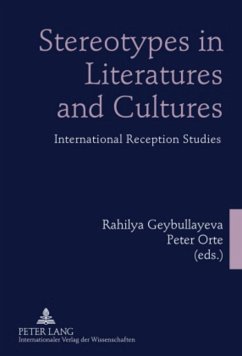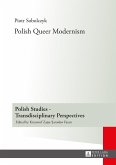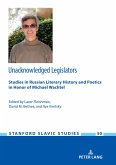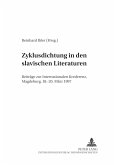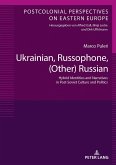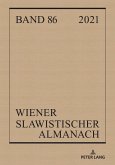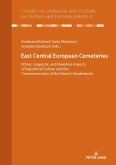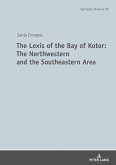Stereotypes in Literatures and Cultures
International Reception Studies
Herausgegeben:Orte, Peter; Geybullayeva, Rahilya
Stereotypes in Literatures and Cultures
International Reception Studies
Herausgegeben:Orte, Peter; Geybullayeva, Rahilya
- Gebundenes Buch
- Merkliste
- Auf die Merkliste
- Bewerten Bewerten
- Teilen
- Produkt teilen
- Produkterinnerung
- Produkterinnerung
Imaginative representations of different cultures are one of the major stumbling blocks to understanding, deepening the gap between people as they are passed from one text to another, especially in periods of historical transition. These transfers are sometimes innocent, while at other times they serve political agendas. The sample of images and estimations of others becomes a priority and, frequently for this reason, stereotypical. This is the subject of investigation for the majority of the authors in this collection. This book with articles presented here is an attempt to understand the…mehr
Andere Kunden interessierten sich auch für
![Polish Queer Modernism Polish Queer Modernism]() Piotr SobolczykPolish Queer Modernism67,75 €
Piotr SobolczykPolish Queer Modernism67,75 €![Unacknowledged Legislators Unacknowledged Legislators]() Unacknowledged Legislators168,30 €
Unacknowledged Legislators168,30 €![Zyklusdichtung in den slavischen Literaturen Zyklusdichtung in den slavischen Literaturen]() Zyklusdichtung in den slavischen Literaturen127,95 €
Zyklusdichtung in den slavischen Literaturen127,95 €![Ukrainian, Russophone, (Other) Russian Ukrainian, Russophone, (Other) Russian]() Marco PuleriUkrainian, Russophone, (Other) Russian64,20 €
Marco PuleriUkrainian, Russophone, (Other) Russian64,20 €![Wiener Slawistischer Almanach Band 86/2021 Wiener Slawistischer Almanach Band 86/2021]() Wiener Slawistischer Almanach Band 86/202189,00 €
Wiener Slawistischer Almanach Band 86/202189,00 €![East Central European Cemeteries East Central European Cemeteries]() East Central European Cemeteries42,95 €
East Central European Cemeteries42,95 €![The Lexis of the Bay of Kotor: The Northwestern and Southeastern Area The Lexis of the Bay of Kotor: The Northwestern and Southeastern Area]() Sanja CrnogoracThe Lexis of the Bay of Kotor: The Northwestern and Southeastern Area62,90 €
Sanja CrnogoracThe Lexis of the Bay of Kotor: The Northwestern and Southeastern Area62,90 €-
-
-
Imaginative representations of different cultures are one of the major stumbling blocks to understanding, deepening the gap between people as they are passed from one text to another, especially in periods of historical transition. These transfers are sometimes innocent, while at other times they serve political agendas. The sample of images and estimations of others becomes a priority and, frequently for this reason, stereotypical. This is the subject of investigation for the majority of the authors in this collection. This book with articles presented here is an attempt to understand the core of confirmed or standardized social norms.
The book contains articles in English and in Russian language.
The book contains articles in English and in Russian language.
Produktdetails
- Produktdetails
- Verlag: Peter Lang
- Artikelnr. des Verlages: 260448
- Seitenzahl: 316
- Erscheinungstermin: 7. Mai 2010
- Englisch, Russisch
- Abmessung: 216mm x 153mm x 21mm
- Gewicht: 510g
- ISBN-13: 9783631604489
- ISBN-10: 3631604483
- Artikelnr.: 29124544
- Herstellerkennzeichnung Die Herstellerinformationen sind derzeit nicht verfügbar.
- Verlag: Peter Lang
- Artikelnr. des Verlages: 260448
- Seitenzahl: 316
- Erscheinungstermin: 7. Mai 2010
- Englisch, Russisch
- Abmessung: 216mm x 153mm x 21mm
- Gewicht: 510g
- ISBN-13: 9783631604489
- ISBN-10: 3631604483
- Artikelnr.: 29124544
- Herstellerkennzeichnung Die Herstellerinformationen sind derzeit nicht verfügbar.
The Editors: Rahilya Geybullayeva is Professor and Head of the Department of Journalism and Azerbaijani Literature at Baku Slavic University. She holds a Ph.D. from Moscow State University and served as Visiting Professor as Fulbright Scholar at the University of Wisconsin (USA) and as UNESCO scholar at SOAS, London. Peter Orte is a Ph.D. student of Comparative Literature Department at the University of Wisconsin (USA).
Contents: Aslan Mammadli: Circassians in Russian sources - Nino Kvirikadze: The phenomenon of German nation in Thomas Mann's essay «Germany and the Germans» - Gönül Bakay: Turks or Jews? - Kun Jong Lee: Stereotypes of Korean Americans in African American popular culture - Izabella Horvath: Uygur scholar's significant discovery: Ancient Uygur historian says Xiongnu are Turks - Irine Modebadze: «Own» and «Others» in contemporary Georgian prose - Naida Khaybullina/M. M. Khaybullina (in Russian language): Caucasus images and stereotypes in Russian prose of XIX century - Tatyana Megrelishvili (in Russian language): Russian-speaking literary Tbilisi as phenomenon of modern intercultural discourse - Guler Abdullabekova (in Russian language): The East in European literary monuments: Persian culture in Polish classic literature - Sudha Swarnakar: Rosie, the stereotype adulteress or a free woman: A Comparative analysis of R. K. Narayan's novel The Guide and Vijay Anand's film Guide - Aslan Mammadli: Kurban Said. Pro et contra: attempt of cultural - linguistic analysis of a fictional text - Rahilya Geybullayeva: About stereotypes without stereotypes? - Iraida Krotenko: Status and prospects of National Literary Studies in Literary Theory - Irma Ratiani: Carnival narrative, social imagology and the principles of comparative analyses - Inna Kalita (in Russian language): Ideas of Ian Mukarjovsky in context of the beginning of structuralism and crossing of the two centuries - Izabella Horvath: A lesson in historiography by a contemporary of the Xiungnu: Sima Qian and Chinese Historiography - Paul Dumont: Western exoticism in the accounts of Ottoman travellers in Europe - Didier Francfort: National stereotypes in French and Russian music: cross perceptions of foreign cultures in the building of national music (1800-1990) - Fatima Festic: Myths and memory at crossroads: stereotypes versus complex identities among the South Slavs and the rest - Eric Schmulévitch (in Russian language): Image of the French as described in the film from Stalin period «The Oath», 1946 by Michaels Chiaureli - Gül Mete Yuva: XIX esr türk ve fransiz edebiyatlarinda birbirlerine ait kliseler - Maka Elbakidze: Stereotypes of the identification of genre: The Knight in the Panther's Skin - Alena Sarbasheva (in Russian language): Improvised character of lamentation songs in Karachay-Balkarian folklore - Alexander Bushev (in Russian language): Meta-Irony on the stereotypes in modern fiction - Fatima Uzdenova (in Russian language): North Caucasian poem: perspectives - Sevinj Baxish: The stereotypes of the patriarchal worldview and its overcoming in works of K. Jung and L. Irigaray - Nigiar Isgandarova: Gender problems in women' novels in the XYIII-XIX centuries - Elnara Garagyezova: Stereotypes of women in Azerbaijani literature - Maria Mikhaylova (in Russian language): Creative individuality and image of a writer: the history of G. Zapolskaya's works in Russia / gender aspect - Anvar Galiyev (in Russian language): Myth about nomadism - Aleksey Olyanich (in Russian language): Lingvo-semiotic characteristics of Russian hunting - Jambul Akkaziev: In the Distant Confines: A narrative of colonial presence - Kenul Aslanova: Concept of national culture in literary works of Alibey Huseynzade - Alexander Skiperskikh (in Russian language): Sources of power in H. C. Andersen's fairy tales: a political analysis.
Contents: Aslan Mammadli: Circassians in Russian sources - Nino Kvirikadze: The phenomenon of German nation in Thomas Mann's essay «Germany and the Germans» - Gönül Bakay: Turks or Jews? - Kun Jong Lee: Stereotypes of Korean Americans in African American popular culture - Izabella Horvath: Uygur scholar's significant discovery: Ancient Uygur historian says Xiongnu are Turks - Irine Modebadze: «Own» and «Others» in contemporary Georgian prose - Naida Khaybullina/M. M. Khaybullina (in Russian language): Caucasus images and stereotypes in Russian prose of XIX century - Tatyana Megrelishvili (in Russian language): Russian-speaking literary Tbilisi as phenomenon of modern intercultural discourse - Guler Abdullabekova (in Russian language): The East in European literary monuments: Persian culture in Polish classic literature - Sudha Swarnakar: Rosie, the stereotype adulteress or a free woman: A Comparative analysis of R. K. Narayan's novel The Guide and Vijay Anand's film Guide - Aslan Mammadli: Kurban Said. Pro et contra: attempt of cultural - linguistic analysis of a fictional text - Rahilya Geybullayeva: About stereotypes without stereotypes? - Iraida Krotenko: Status and prospects of National Literary Studies in Literary Theory - Irma Ratiani: Carnival narrative, social imagology and the principles of comparative analyses - Inna Kalita (in Russian language): Ideas of Ian Mukarjovsky in context of the beginning of structuralism and crossing of the two centuries - Izabella Horvath: A lesson in historiography by a contemporary of the Xiungnu: Sima Qian and Chinese Historiography - Paul Dumont: Western exoticism in the accounts of Ottoman travellers in Europe - Didier Francfort: National stereotypes in French and Russian music: cross perceptions of foreign cultures in the building of national music (1800-1990) - Fatima Festic: Myths and memory at crossroads: stereotypes versus complex identities among the South Slavs and the rest - Eric Schmulévitch (in Russian language): Image of the French as described in the film from Stalin period «The Oath», 1946 by Michaels Chiaureli - Gül Mete Yuva: XIX esr türk ve fransiz edebiyatlarinda birbirlerine ait kliseler - Maka Elbakidze: Stereotypes of the identification of genre: The Knight in the Panther's Skin - Alena Sarbasheva (in Russian language): Improvised character of lamentation songs in Karachay-Balkarian folklore - Alexander Bushev (in Russian language): Meta-Irony on the stereotypes in modern fiction - Fatima Uzdenova (in Russian language): North Caucasian poem: perspectives - Sevinj Baxish: The stereotypes of the patriarchal worldview and its overcoming in works of K. Jung and L. Irigaray - Nigiar Isgandarova: Gender problems in women' novels in the XYIII-XIX centuries - Elnara Garagyezova: Stereotypes of women in Azerbaijani literature - Maria Mikhaylova (in Russian language): Creative individuality and image of a writer: the history of G. Zapolskaya's works in Russia / gender aspect - Anvar Galiyev (in Russian language): Myth about nomadism - Aleksey Olyanich (in Russian language): Lingvo-semiotic characteristics of Russian hunting - Jambul Akkaziev: In the Distant Confines: A narrative of colonial presence - Kenul Aslanova: Concept of national culture in literary works of Alibey Huseynzade - Alexander Skiperskikh (in Russian language): Sources of power in H. C. Andersen's fairy tales: a political analysis.

